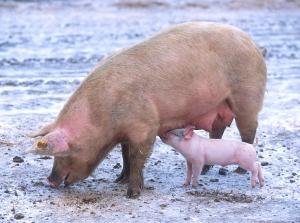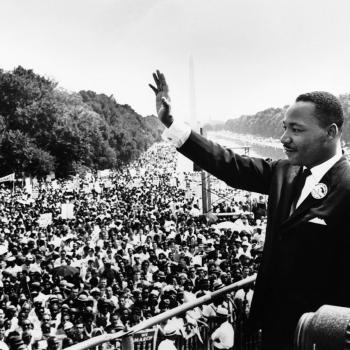
I remember exactly what we were doing when we received the news that Christopher was in emergency surgery two years ago today. We had purchased tickets from the Portland Art Museum to watch the film Gunda online at home that evening. Gunda provides an in-depth view of the life of a pig presumably named “Gunda,” from the time she gives birth to a litter of pigs to the time they are taken away in a truck, likely to market or the slaughterhouse.
The movie was almost finished, when my wife and I received a phone call that nearly finished us. Just as Gunda, the mother pig, appeared disoriented, seemingly frantic, going about searching for her piglets who had been taken away from her, our daughter-in-law Keyonna called with the alarming news that our son Christopher was in emergency surgery. He had endured a traumatic brain injury. As you can imagine, we were all disoriented and frantic. To this day, I recall feeling a bit like Gunda.
Today is a very hard day, as you can imagine. As Mariko often says, “I miss my son.” Of course, we are grateful that we get to see Christopher daily, move his limbs, stroke his hair, and talk to him. Yet, he has not uttered more than a word or two on several occasions to staff in two years’ time, though he does make vocal noises. What a far cry from the Christopher who could converse for hours on end on all kinds of subjects before TBI altered our lives. I often felt like my brain would explode after one of our conversations. Now it often explodes because of the relentless ordeal.
Interestingly, Gunda, the black and white documentary, includes no words, just sounds like grunts and squeals. And yet, there is a message that comes through loud and clear. Animals like these pigs, the herd of cows, and a one-legged chicken, are sentient beings. They are not automatons. You look these creatures in the eye, on their timetable of daily existence, and somehow mysteriously see life from a new, realistic, humane angle reflected through their gaze. Taking animals to heart, feeling their emotions, can serve to humanize us humans. Perhaps this film’s focus on a pig and its fellow creatures’ sentience and its humanizing ethos is why the film speaks to vegans and non-vegans alike across the globe.
While the film maker Victor Kossakovsky is a vegetarian and executive producer Joaquin Phoenix is a vegan, Gunda “isn’t heavy-handed, moralizing, polemical or sentimental.” Still, I don’t think non-vegan me will ever look at bacon or beef or poultry the same way again. A New York Times review put it this way:
Kossakovsky isn’t waving any flags, but “Gunda” is a reminder that the resistance to showing animals in most movies reflects how we no longer look at them, to borrow a thought from the critic John Berger. It also speaks to our unwillingness to acknowledge our abuse of other creatures and, by extension, the natural world. It is, for instance, awfully easy to eat meat; in the developed world, it requires little thought, effort or money. It’s more difficult and certainly more inconvenient to think about the violence inherent in its production, including the environmental devastation. And so, cut off from the natural world, we largely classify animals as pets or meat.
In his moving, prophetic 1977 essay “Why Look at Animals?,” Berger considered the tragic costs of humanity’s putative march toward progress and away from the natural world. “To suppose that animals first entered the human imagination as meat or leather or horn is to project a 19th-century attitude backwards across the millennia,” Berger writes. “Animals first entered the imagination as messengers and promises.”
I wonder if our objectification of animals reflects the objectification of ourselves as humans. It reminds me of David Brooks’ New York Times opinion piece on personalism, which, like Gunda, I have reflected on for some time. Brooks writes:
…our culture does a pretty good job of ignoring the uniqueness and depth of each person. Pollsters see in terms of broad demographic groups. Big data counts people as if it were counting apples. At the extreme, evolutionary psychology reduces people to biological drives, capitalism reduces people to economic self-interest, modern Marxism to their class position and multiculturalism to their racial one. Consumerism treats people as mere selves — as shallow creatures concerned merely with the experience of pleasure and the acquisition of stuff.
Just as I will likely never look at bacon or beef or poultry the same way again, since watching Gunda, I will likely never look at people in adult care facilities the same way again. My son is more than a traumatically brain-injured individual. He is more than his biological drives. So, too, are the adults, mostly much older than my minimally conscious Christopher, whom I see lying on beds, some on vents and hooked up to feeding machines, others moving about somewhat freely in wheelchairs. Like you and me, they are feeling, sentient beings, longing for someone to sit beside them, talk to them, and know their stories. But will we take time to listen, or are we too busy as we go about our business trying to be the center of the universe in our overly-developed world?
Ever since the faulty modernist historiography arose that humans are no longer worthy of dignity and honor in the universe, mistakenly thought to result from Copernicus’ heliocentric revolution, we have been frantically working to make ourselves the center of everything. In our insecure effort to grasp at significance, we have been reducing, objectifying, and commodifying life all around us, including animals, and doing the same thing to ourselves in the process. At least, that’s been my recurring tendency.
I have written about this problem in various contexts, including at Patheos and in a forthcoming ethics volume on personalism. In my book on personalism, I reflect upon the argument of the historian Peter Harrison, who writes on this subject:
“anthropocentrism” is not in itself a fundamental driving force in the exploitation of nature. Rather, modern intellectuals distorted the Copernican Revolution to signify a loss of human worth and dignity. Ironically perhaps, this sense of loss fueled domination and exploitation [According to Harrison]: “For the moderns, it was precisely the loss of this centrality that motivated the quest to conquer an obstinate and uncooperative earth.” {Peter Harrison, “Subduing the Earth: Genesis 1, Early Modern Science, and the Exploitation of Nature,” The Journal of Religion (January 1999): 107; quoted in Paul Louis Metzger, More Than Things: A Personalist Ethics for a Throwaway Culture (IVP Academic, 2023).}
In contrast to this distorted modernist outlook that Harrison highlights, fellow historian Dennis Danielson writes that in the Bible, the backdrop of the creation’s greatness and grandeur “frames one’s sense of privilege at being an object of divine blessing despite one’s conspicuous finitude and smallness relative to the world at large,” as illustrated in Psalm 8. {Dennis R. Danielson, Galileo Goes to Jail: And Other Myths About Science and Religion (Harvard University Press, 2009), 52.}
We are all finite, fragile, mortal creatures. This truth came home to me like never before when I watched Gunda and received that call my beloved Christopher was undergoing emergency brain surgery. Ever since that night, with all the resulting emotional turmoil and neuro-storming, I can’t get enough of reflecting on this subject. As one movie review states, “Gunda, a film about pig sentience, took the world by storm. And if the reviews are anything to go by, critics—vegans and non-vegans alike—simply can’t get enough.” We may be finite, fragile, and mortal. But all creation, no matter how great or small, is precious to God, including animals on farms and people in adult care facilities. May we be ever diligent to foster humaneness rather than act as swine toward pigs, cows, chicken, and our fellow humans. May we never get enough of the need to treat other sentient beings as more than things.
For the various posts that I have written since our unfathomable journey with TBI began, please go to this link. Thank you for your interest and prayers.

















